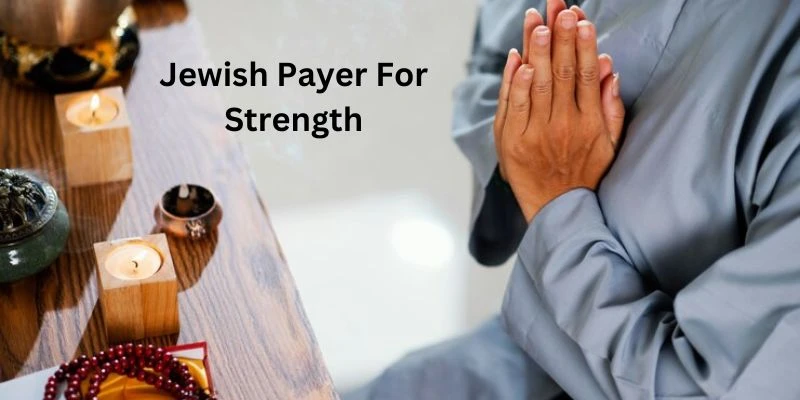The significance of Jewish prayer for strength in Jewish tradition
Updated: March 30, 2024
376
In Judaism, prayer is crucial to Attach to God and seek guidance and strength. There are many prayers for different needs; seeking strength is a common theme.
These prayers acknowledge that life can be difficult, but they also express faith in God’s ability to provide support and resilience. Through worship, Jewish prayer for strength find solace and inspiration to navigate challenges and emerge stronger.
Prayer can provide comfort and guidance in times of difficulty
Life throws challenges, leaving us feeling lost, scared, or worn down. In these challenging times, many find solace and strength in prayer. It can be a wellspring of comfort, a guiding light, and the inner power to bounce back.

Jewish Prayer for Healing And Strength
Dear God, please bring complete healing to [name]. Mend their body and spirit, and forgive their mistakes. Surround them with your love and protection, and fill their life with good health, peace, and strength. Amen.
Historical Background of Jewish prayer for strength
1-A Journey Through Time: Jewish Prayers for Strength
Jewish history is woven with threads of resilience. It is no surprise that prayers for strength have been a constant companion on this journey. While no single ancient prayer is specifically for strength, the concept is woven throughout the Jewish liturgy.
2-From Temple to Transformation
Before the destruction of the Second Temple in 70 CE, sacrifices were central to Jewish practice. But with exile, rabbis turned to prayer as a substitute. With their pleas and expressions of trust in God, Psalms became a source of strength.
3-Strength Found in Words
The daily prayers (Amidah) became a cornerstone. Specific blessings within them, like those for facing challenges or for judges seeking wisdom, offered strength in various situations.
4-The Power of Community
Prayers for healing (Mi Shebeirach), a tradition with roots possibly as old as the 12th century, provided strength for the sick and the entire community coming together in support.
5-A Living Legacy
Today, the Jewish prayer for strength continues to evolve. New prayers are written to address contemporary challenges, while ancient ones continue to provide solace and resilience. This rich tapestry of prayers reflects the enduring spirit of the Jewish people.
Types of Jewish Prayers for Strength
There are many different types of Jewish prayers for strength, each with its specific focus. Here are a few of the most common:
Tefilat HaDerech (The Traveler’s Prayer)
This prayer is recited before embarking on a journey, whether it is a literal trip or a metaphorical one. It asks for God’s protection and guidance along the way.
Mi Sheberach (May the One Who Blesses)
This prayer is recited for someone who is sick or going through a difficult time. It asks for God’s healing and comfort.
Prayers who can offer support and encouragement during challenging times
Prayers can be a powerful source of comfort and strength, especially during tough times.
- For Strength
Things are feeling difficult right now. Please give me the strength to face these challenges and keep going. I know I am not alone.
- For Help
It is hard to ask, but I need your help immediately. Please help me go in the right direction and surround me with supportive people.

The Power of Community Prayer
Community prayer is when people who believe in something similar get together and pray for things together. It is like adding your voice to the voices of others to make your prayers stronger.
- Support
Being with others who are praying for similar things can make you feel stronger and less alone.
- Unity
Praying together creates a sense of unity and connection with others in your community.
Importance of Communal Prayer in Jewish Tradition
Strength in numbers
Imagine you are asking your parents for something. If you team up with your siblings and ask together, it is more likely they’ll hear you! In Jewish tradition, praying with others is seen as stronger and more likely to be noticed by God
Finding Strength Through Jewish Prayer
Jewish prayers offer beautiful ways to ask for strength during difficult times. Here are some easy ways to incorporate them into your spiritual routine:
Morning Bracha (Blessing)
Start your day with a prayer of gratitude and strength. A simple one is “Baruch atah Adonai Eloheinu Melech ha-olam, she-lo natan lanu guf chalash v’nefesh maara” (Thank you, God, our King, for giving us a healthy body and a strong spirit).
Psalms for Encouragement
The Psalms (Tehillim) in the Hebrew Bible are full of prayers for strength. Find one that resonates with you and recite it when you need a pick-me-up.
Conclusion
Jewish prayer is like a powerful toolbox for getting strong. When you feel weak, there are prayers that remind you of God’s love and care, giving you courage. There are even blessings that thank God for the strength you already have inside you, even if you can not feel it right now. Jewish prayer is not just about asking for help, it is about remembering all the reasons you can be strong.
FAQs
What is the purpose of a Jewish prayer for strength?
A Jewish prayer for strength is meant to ask God for the courage, resilience, and energy to overcome challenges and difficulties.
What is a traditional Jewish prayer for strength?
One traditional prayer is the “Mi Sheberach” prayer, which asks God to bless the person with strength, courage, and healing.
Can I pray for strength for someone else?
Yes, in Judaism, it’s common to pray for the well-being and strength of others, including friends, family members, and community leaders.
How often should I pray for strength?
You can pray for strength as often as you need to, whether daily, weekly, or during times of crisis.
What are some key themes in Jewish prayers for strength?
Common themes include asking for God’s protection, guidance, and healing, as well as expressing gratitude and trust in God’s power.
Can I add my intentions to a Jewish prayer for strength?
Yes, Judaism encourages individuals to add personal thoughts, feelings, and intentions to traditional prayers.
Please Write Your Comments